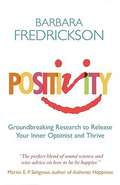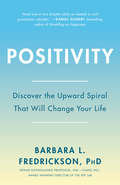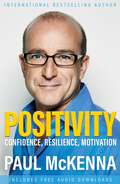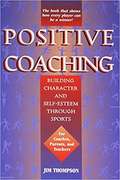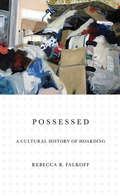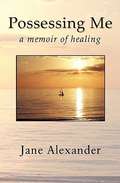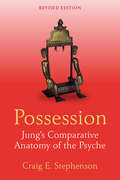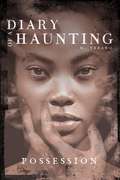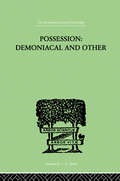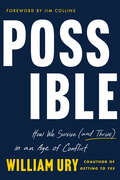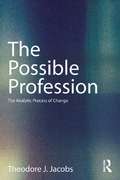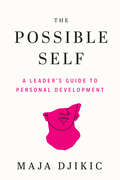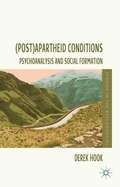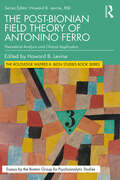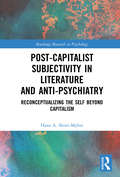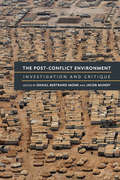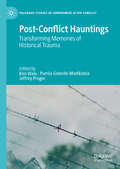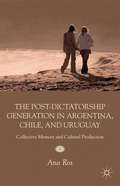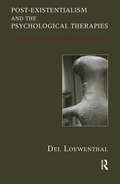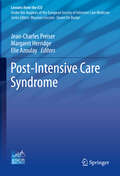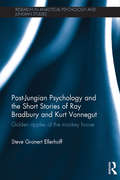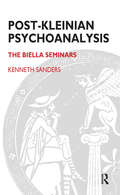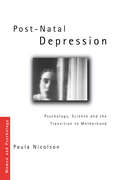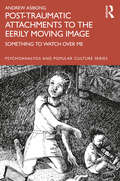- Table View
- List View
Positivity: Groundbreaking Research to Release Your Inner Optimist and Thrive
by Barbara FredricksonOne of the leading members of the positive psychology movement draws on cutting-edge research and lab-tested tools to explain: Why positivity is more important than happiness How it relieves depression, broadens minds, and builds lives How to tap into your own sources of positivity With Positivity, you'll learn to see new possibilities, bounce back from setbacks, connect with others, and become the best version of yourself.
Positivity: Groundbreaking Research to Release Your Inner Optimist and Thrive
by Barbara FredricksonDrawing on more than twenty years of scientific research into positive emotions, world renowned researcher Dr Barbara Fredrickson shows us that attaining positivity is not about striving to be an annoyingly and unnaturally cheerful `Pollyanna'. Rather, it is about putting into practice the `3-to-1 ratio' of positive to negative emotions, the crucial tipping point that will enable you to embark on an `upward spiral' towards a healthier, more vibrant, and flourishing life.
Positivity: Confidence, Resilience, Motivation
by Paul McKennaDo you want more optimism, confidence, resilience and motivation? Then this book is for you! We currently live in a time of unprecedented challenges, uncertainty, overwhelming stress, loss of hope at times and a need for mental strength and adaptability to a new way of life.Traditional 'positive thinking', trying to constantly tell yourself that everything is OK, no matter the circumstances, just isn't enough to make any lasting difference.After 30 years working as a therapist, Paul McKenna has developed a unique approach – one that can guide you towards an all-round feeling of positivity – putting you into optimal states of mind, building up your resilience and enabling good decisions and actions that lead to successful results in life.There is now irrefutable scientific evidence that shows that particular ways of thinking and acting produce tangible positive results in people's ability to deal with challenges and their overall quality of life. The research also shows that this mindset can be learned quickly just like any habit.And that is why this book is a practical psychological system in how to survive and thrive – how to discover your own natural most powerful resources for self-care, self-belief and for taking control of your life.
Positivity: Confidence, Resilience, Motivation
by Paul McKennaDo you want more optimism, confidence, resilience and motivation? Then this book is for you! We currently live in a time of unprecedented challenges, uncertainty, overwhelming stress, loss of hope at times and a need for mental strength and adaptability to a new way of life.Traditional 'positive thinking', trying to constantly tell yourself that everything is OK, no matter the circumstances, just isn't enough to make any lasting difference.After 30 years working as a therapist, Paul McKenna has developed a unique approach – one that can guide you towards an all-round feeling of positivity – putting you into optimal states of mind, building up your resilience and enabling good decisions and actions that lead to successful results in life.There is now irrefutable scientific evidence that shows that particular ways of thinking and acting produce tangible positive results in people's ability to deal with challenges and their overall quality of life. The research also shows that this mindset can be learned quickly just like any habit.And that is why this book is a practical psychological system in how to survive and thrive – how to discover your own natural most powerful resources for self-care, self-belief and for taking control of your life.
Positve Coaching: Building Character and Self-Esteem Through Sports
by Jim ThompsonPositive Coaching is jam packed with information for coaches in any sport. The book includes over 200 coaching recommendations on specific psychological, motivational, and behavioral situations. There is a special focus on the coach as storyteller -- 50 motivational stories can be used to develop strong communication with athletes.
Possessed: A Cultural History of Hoarding
by Rebecca R. FalkoffIn Possessed, Rebecca R. Falkoff asks how hoarding—once a paradigm of economic rationality—came to be defined as a mental illness. Hoarding is unique among the disorders included in the American Psychiatric Association's DSM-5, because its diagnosis requires the existence of a material entity: the hoard. Possessed therefore considers the hoard as an aesthetic object produced by clashing perspectives about the meaning or value of objects. The 2000s have seen a surge of cultural interest in hoarding and those whose possessions overwhelm their living spaces. Unlike traditional economic elaborations of hoarding, which focus on stockpiles of bullion or grain, contemporary hoarding results in accumulations of objects that have little or no value or utility. Analyzing themes and structures of hoarding across a range of literary and visual texts—including works by Nikolai Gogol, Arthur Conan Doyle, Carlo Emilio Gadda, Luigi Malerba, Song Dong and E. L. Doctorow—Falkoff traces the fraught materialities of the present to cluttered spaces of modernity: bibliomaniacs' libraries, flea markets, crime scenes, dust-heaps, and digital archives. Possessed shows how the figure of the hoarder has come to personify the economic, epistemological, and ecological conditions of modernity.Thanks to generous funding from New York University and its participation in TOME (Toward an Open Monograph Ecosystem), the ebook editions of this book are available as Open Access (OA) volumes from Cornell Open (cornellopen.org) and other Open Access repositories.
Possessing Me: A Memoir of Healing
by Jane AlexanderThe author describes in exacting detail, her eventual path to healing from childhood neglect and abandonment, post traumatic stress disorder and manic depression, as she discovers the secret to lasting happiness.
Possession: Jung's Comparative Anatomy of the Psyche
by Craig E. StephensonThe first edition of this illuminating study, addressed both to readers new to Jung and to those already familiar with his work, offered fresh insights into a fundamental concept of analytical psychology. This revised edition has been fully updated to reflect the publication of the DSM-5. Craig Stephenson anatomizes Jung’s concept of possession, reinvesting Jungian psychotherapy with its positive potential for practice. Analogizing the concept – lining it up comparatively beside the history of religion, anthropology, psychiatry, and even drama and film criticism – offers not a naive syncretism, but enlightening possibilities along the borders of these diverse disciplines. An original, wide-ranging exploration of phenomena both ancient and modern, Possession offers a conceptual bridge between psychology and anthropology, challenges psychiatry to culturally contextualize its diagnostic manual, and posits a much more fluid, pluralistic and embodied notion of selfhood. It will prove essential reading for Jungian psychotherapists, analytical and depth psychologists and psychiatrists as well as academics and students of anthropology, mythology and religious studies.
Possession
by M. VeranoIn the tradition of Paranormal Activity and The Exorcist, an ordinary girl with a strange illness that doctors can't seem to diagnose recounts her experience with the dark and ancient entity that's making her sick in this chilling diary that features photos and images of what she experienced.All her life, Laetitia Jones has only wanted to be a star. It's more than an ambition--somewhere deep inside, she knows that she was born for greatness. But her path to stardom now seems to be halted by a mysterious, undiagnosed illness that's taken over her body. Doctors don't have a clue and most days, she's stuck at home documenting her strange symptoms--symptoms that start with fevers and chills, but soon escalate to bizarre bodily reactions. Laetitia's only escape from her illness is following the news--and the race riots that are moving closer and closer to her neighborhood. But when horrific visions begin to invade her mind, even the media can't distract her and she begins to wonder--is her illness something biological...or is it something more? Are the voices she hears and the notes she finds in her own handwriting signs of insanity...or signs of something much more sinister and demonic? Or, perhaps, signs of something benevolent...something holy even. Laetitia has always known she'd be famous...she just didn't know it would happen this way.
Possession, Demoniacal And Other: Among Primitive Races, in Antiquity, the Middle Ages and Modern
by Oesterreich, T KThis is Volume III of six in a series on Anthropology and Psychology. Originally published in 1930, this collection of papers looks at possession, demonical and other, among primitive races, in antiquity, the Middle Ages and modern times.
Possible: How We Survive (and Thrive) in an Age of Conflict
by William UryThe author of the world’s best-selling book on negotiation draws on his nearly fifty years of experience and knowledge grappling with the world’s toughest conflicts to offer a way out of the seemingly impossible problems of our time. Conflict is increasing everywhere, threatening everything we hold dear—from our families to our democracy, from our workplaces to our world. In nearly every area of society, we are fighting more and collaborating less, especially over crucial problems that demand solutions.With this groundbreaking book, bestselling author and international negotiator William Ury shares a new “path to possible”—time-tested practices that will help readers unlock their power to constructively engage and transform conflict. Part memoir, part manual, part manifesto, Possible offers stories and sage advice from Ury’s nearly 50 years of experience on the front lines of some of the world’s toughest conflicts.One of the world’s top experts in the field, Ury has worked on conflicts ranging from boardroom battles to labor strikes, from the US partisan divide to family feuds, from wars in the Middle East, Colombia and Ukraine to helping the US and USSR avoid nuclear disaster. Now, in Possible, he helps us tackle the seemingly intransigent problems facing us.In Possible, Ury argues conflict is natural. In fact, we need more conflict, not less—if we are to grow, change, evolve and solve our problems creatively. While we may not be able to end conflict, we can transform it—unleashing new, unexpected possibilities.Successfully tested at Harvard University with almost a thousand participants from business, government, academia, and the nonprofit sector, Ury’s “Path to Possible” proved so valuable that Harvard’s Program on Negotiation selected it as its inaugural online daylong in April 2022.Possible introduces Ury’s methods and makes them available for everyone. Combining accessible frameworks and powerful storytelling and offering dozens of examples, it is an essential guide for anyone looking to break through the toughest conflicts—in their workplace, family, community or the world.
The Possible Profession: The Analytic Process Of Change
by Theodore J. JacobsThe Possible Profession: The Analytic Process of Change takes a fresh look at the many forms of unconscious communication that take place in the analytic situation. Bringing together two decades of the author’s previous writing as well as a considerable amount of new material, this book addresses a major contemporary issue in the field of psychoanalysis. Unconscious communication in the analytic situation takes many forms. This book explores a number of these pathways as the author has encountered them in clinical work. Including numerous clinical examples, chapters cover a variety of topics with a central focus on: the relationship between the inner worlds of patient and analyst the interplay between these intrapsychic forces how this interaction affects the analytic process and, more specifically, the therapeutic action of psychoanalysis. Written in a clear and concise way this book contributes to a new understanding of familiar material in a way that will be welcomed by teachers, students, and practitioners of psychoanalysis and psychotherapy. It will also be of interest to dynamic therapists of all persuasions and academics in various fields interested in psychoanalytic thinking.
The Possible Self: A Leader's Guide to Personal Development
by Maja DjikicSometimes success isn't enough—discover how to achieve lasting, whole-life fulfillment through a simple five-stage plan that corresponds with the five key parts of ourselves.We're often told that the key to success in life involves advancing in our careers, so why do feel stuck and unfulfilled when everything seems to be going right?Adult development expert Maja Djikic explains that in order to discover our purpose and achieve real, lasting change, we need to move beyond narrowly targeted ideas and strategies like changing our mindset or slightly altering one aspect of our behavior. Instead, we need to go deeper and focus on our innate desires.Djikic says that sustained change can only happen when our whole self moves holistically the same direction and at the same time. She introduces a transformational system called the Wheel of Change—a simple, five-segment plan that corresponds with the five key parts of ourselves: Desires, Actions, Emotions, Thoughts, and Body.By understanding the mechanisms of these five integral parts, you will be able to escape the paradox of success without happiness and move towards your own path of fulfilling self-development.
: Psychoanalysis and Social Formation (Studies in the Psychosocial)
by Derek Hook(Post)Apartheid Conditions.
The Post-Bionian Field Theory of Antonino Ferro: Theoretical Analysis and Clinical Application (The Routledge Wilfred R. Bion Studies Book Series)
by Howard B. LevineThis exciting and original collection explores Antonino Ferro’s post-Bionian Field Theory, expanding upon the analytic work of Wilfred Bion to focus on the intersubjective development of psychic regulatory processes. Written by members of the Boston Group for Psychoanalytic Studies who have maintained a close and fruitful collaboration with Ferro and his colleagues, the book centers on understanding, engaging and treating primitive mental states. Ferro's Field Theory operationalizes Bion’s concept of an analyst who is not the repository of ‘the truth’, but is instead one who has the capacity to listen, to dwell in doubt, to utilize reverie, humor and play, and facilitate the transformation of previously unthinkable aspects of the patient’s experience into articulatable mental elements such as pictorial images, thoughts and dreams. Ferro’s contributions and their analysis are especially relevant to working with primitive character disorders, the difficulties of which lie beyond neurosis and the comfortable reach of the precepts of classical analytic technique. Each chapter features detailed clinical examples that explicate and apply post-Bionian Field Theory, making this book an interesting and useful read for analysts and analytic therapists of all orientations, who work with patients in all diagnostic categories.
Post-Capitalist Subjectivity in Literature and Anti-Psychiatry: Reconceptualizing the Self Beyond Capitalism (Routledge Research in Psychology)
by Hans A. Skott-MyhreThrough the examination of anti-psychiatric theory and literary texts, this timely and thought-provoking volume explores the possibilities of liberating our habitual patterns of perception and consciousness beyond the confines of a capitalist era. In Post-Capitalist Subjectivity in Literature and Anti-Psychiatry, Skott-Myhre asks the question, how might we be different if we didn’t live in a capitalist society? By drawing on Marxist and post-Marxist theory, and conducting nuanced analysis of the professional writings of anti-psychiatrists including Basaglia and Laing, and the work of fiction writers Kafka and García Márquez, the text identifies alternative conceptualizations of the self. Focusing in particular on portrayals of institutions and the family, Skott-Myhre proposes that these social systems offer new modes of reading the world and ourselves which will transform social organization and free subjectivity from dominant capitalist structures. This transdisciplinary text responds to a revitalized interest in alternatives to traditional psychology, an interest in life beyond capitalism, and the crisis in the traditional family. Post-Capitalist Subjectivity in Literature and Anti-Psychiatry will offer timely reading for graduate students, researchers, and scholars in the fields of cultural studies, psychology, philosophy, family studies, and interdisciplinary studies.
Post-conflict Environment: Investigation And Critique
by Daniel Bertrand MonkIn case studies focusing on contemporary crises spanning Africa, the Middle East, and Eastern Europe, the scholars in this volume examine the dominant prescriptive practices of late neoliberal post-conflict interventions--such as statebuilding, peacebuilding, transitional justice, refugee management, reconstruction, and redevelopment--and contend that the post-conflict environment is in fact created and sustained by this international technocratic paradigm of peacebuilding. Key international stakeholders--from activists to politicians, humanitarian agencies to financial institutions--characterize disparate sites as "weak," "fragile," or "failed" states and, as a result, prescribe peacebuilding techniques that paradoxically disable effective management of post-conflict spaces while perpetuating neoliberal political and economic conditions. Treating all efforts to represent post-conflict environments as problematic, the goal becomes understanding the underlying connection between post-conflict conditions and the actions and interventions of peacebuilding technocracies.
Post-Conflict Hauntings: Transforming Memories of Historical Trauma (Palgrave Studies in Compromise after Conflict)
by Pumla Gobodo-Madikizela Jeffrey Prager Kim WaleThis book engages the globally pressing question of how to live and work with the haunting power of the past in the aftermath of mass violence. It brings together a collection of interdisciplinary contributions to reflect on the haunting of post-conflict memory from the perspective of diverse country case studies including South Africa, Rwanda, Zimbabwe, Northern Ireland, North and South Korea, Palestine and Israel, America and Australia. Contributions offer theoretical, empirical and practical insights on the nature of historical trauma and practices of collective healing and repair that include embodied, artistic and culturally relevant forms of wisdom for dealing with the past. While this question has traditionally been explored through the lens of trauma studies in relation to the post-Holocaust experience, this book provides new understandings from a variety of different historical contexts and disciplinary perspectives. Its chapters draw on, challenge and expand the trauma concept to propose more contextually relevant frameworks for transforming haunted memory in the aftermath of historical trauma.
The post-dictatorship generation in Argentina, Chile, and Uruguay
by Ana RosThe Post-Dictatorship Generation in Argentina, Chile, and Uruguay explores how young adults in Argentina, Chile, and Uruguay make sense of the 1970s socialist projects and the ensuing years of repression in their activism, film, and literature.
Post-existentialism and the Psychological Therapies: Towards a Therapy without Foundations
by Del LoewenthalA valuable contribution to the field by a professor of psychotherapy and author and editor of many titles in this area.
Post-Intensive Care Syndrome (Lessons from the ICU)
by Jean-Charles Preiser Margaret Herridge Elie AzoulayThis book, part of the European Society of Intensive Care Medicine textbook series, provides detailed up-to-date information on the physical, cognitive, and psychological impairments that are frequently present following a stay in an intensive care unit and examines in depth the available preventive and therapeutic strategies, including adapted rehabilitation programs. Beyond acquainting readers with the multiple facets of post-intensive care syndrome (PICS), the book aims to promote the effective follow-up of patients, thereby enhancing their ability to work and their functional autonomy, and to identify risk factors for the development of PICS as a stimulus to beneficial organizational changes in intensive care departments.The background to the book is the realization by healthcare providers that the quality of life of patients who have required a stay in an intensive care unit can be severely impaired or even become unacceptable. All too often, the diverse sequelae are overlooked by specialists of other disciplines. Moreover, families and caregivers are also at high risk of post-traumatic stress disorder and depression. The European Society of Intensive Care Medicine has developed the Lessons from the ICU series with the vision of providing focused and state-of-the-art overviews of central topics in Intensive Care and optimal resources for clinicians working in Intensive Care. This book, written by renowned experts in the field, will facilitate the transmission of key knowledge with significant clinical and financial benefits.
Post-Jungian Psychology and the Short Stories of Ray Bradbury and Kurt Vonnegut: Golden Apples of the Monkey House (Research in Analytical Psychology and Jungian Studies)
by Steve Gronert EllerhoffIn this book, Steve Gronert Ellerhoff explores short stories by Ray Bradbury and Kurt Vonnegut, written between 1943 and 1968, with a post-Jungian approach. Drawing upon archetypal theories of myth from Joseph Campbell, James Hillman and their forbearer C. G. Jung, Ellerhoff demonstrates how short fiction follows archetypal patterns that can illuminate our understanding of the authors, their times, and their culture. In practice, a post-Jungian ‘mythodology’ is shown to yield great insights for the literary criticism of short fiction. Chapters in this volume carefully contextualise and historicize each story, including Bradbury and Vonnegut’s earliest and most imaginatively fantastic works. The archetypal constellations shaping Vonnegut’s early works are shown to be war and fragmentation, while those in Bradbury’s are family and the wholeness of the sun. Analysis is complemented by the explored significance of illustrations that featured alongside the stories in their first publications. By uncovering the ways these popular writers redressed old myths in new tropes—and coined new narrative elements for hopes and fears born of their era—the book reveals a fresh method which can be applied to all imaginative short stories, increasing understanding and critical engagement. Post-Jungian Psychology and the Short Stories of Ray Bradbury and Kurt Vonnegut is an important text for a number of fields, from Jungian and Post-Jungian studies to short story theoriesand American studies to Bradbury and Vonnegut studies. Scholars and students of literature will come away with a renewed appreciation for an archetypal approach to criticism, while the book will also be of great interest to practising depth psychologists seeking to incorporate short stories into therapy.
Post-Kleinian Psychoanalysis: The Biella Seminars
by Kenneth SandersThe author's book combines a historical approach to the literature of Freud, Klein and the Post Kleinian development, with demonstrations of the central role of dream analysis. Students and practitioners of psychoanalysis and psychotherapy, educationalists, social scientists, doctors, and alll those who value the endeavour to enrich their work with imagination will find fine food for thought in these seminars, both in the survay of the literature, the case histories described, and in the concluding question and answer debates.
Post-Natal Depression: Psychology, Science and the Transition to Motherhood (Women and Psychology)
by Paula NicolsonPost-Natal Depression challenges the expectation that it is normal to be a 'happy mother'. It provides a radical critique of the traditional medical and social science explanations of 'post natal depression' by supplying a systematic feminist psychological analysis of women's experiences following childbirth. Paula Nicolson argues that, far from it being an abnormal, undesirable, pathological condition, it is a normal, healthy response to a series of losses.Post Natal Depression makes an important contribution to the psychology of women and feminist research and will be of interst to psychologists, social scientists, nurses and doctors.
Post-traumatic Attachments to the Eerily Moving Image: Something to Watch Over Me
by Andrew AsibongThis book explores how traumatic experiences of impingement and neglect – in childhood and adulthood, and at both the family and the state level – may create a desire in us to be parented by certain kinds of screen media that we unconsciously believe are “watching over” us when nothing else seems to be. Andrew Asibong explores how viewers make psychical use of eerily moving images, observed in film and television and later taken into an already traumatised mind, in order to facilitate some form of reparation for a stolen experience of caregiving. It explores the possibility of a media-based “working through” of both the general traumas of early environmental failure and the particular traumas of viewers racialised as Black, eventually asking how politicised film groups in the age of Black Lives Matter might heal from a troubled past and prepare for an uncertain future through the spontaneous discussion – in the here and now – of enlivening images of potentially deadly vulnerability. Post-traumatic Attachments to the Eerily Moving Image: Something to Watch Over Me will be of great interest to academics and students of film, media and television studies, trauma studies and psychoanalysis, culture, race and ethnicity.
